office.mp3: Feeling Fem
It's Women's History Month, so we're showing some serious love from home to our favorite female artists. Pass the time at your casa, and share it with your cat, your plant and your friends on FaceTime.
Stay informed on our latest news!
It's Women's History Month, so we're showing some serious love from home to our favorite female artists. Pass the time at your casa, and share it with your cat, your plant and your friends on FaceTime.
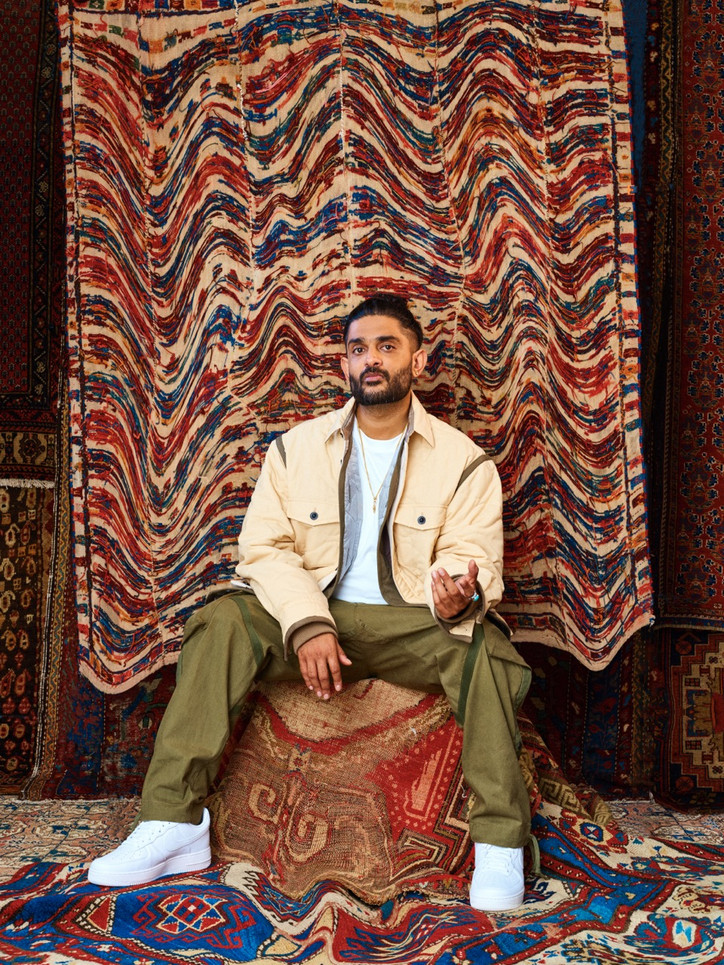
The 13-song experimental album showcases a breadth of musical range, seamlessly intertwining influences from pop, R&B, indie rock, and gospel with an ancestral form of Carnatic music from Southern India. Across the span of 57 minutes, the listener becomes enmeshed in an emotional out-of-body experience – a masterclass in the potency of musical intention. With each track it becomes increasingly evident that this isn’t a commercial endeavor, instead a search and pursuit of truth through an intimate exploration of music as a medium of cross-cultural artistic expression. “I believe that my purpose is to make and perform music that is spiritually charged and allows for healing,” he says. “There is this misconception that healing or spirituality from the East is all super quiet and peaceful and that is definitely an aspect of it. There is also this rawness – not aggressiveness but a certain kind of edge. It's not always going to be pretty and calm but sometimes very energized and intense in a way that is less refined.”
Twelve years ago, Sriram posted a viral Frank Ocean cover (“We All Try”) to YouTube which served as a springboard for his career. Since then, he’s gone on to work with one of the world's foremost contemporary composers, A.R.Rahman, and has been featured on more than 250 tracks throughout countless award-winning Indian-language films. This summer the Tiny Desk Concert, previewing his single "Dear Sahana,” amassed more than a million views across social media platforms and was met with rave reviews. Accruing accolades aside, Sidharth stands on its own as a tonic for the ego – simply press play and prepare to delve beneath the surface of the subconscious and beyond.
Here, Sriram walks us through his origin story: from how he got his start in Indian cinema music as a kid from California to tapping into the state of flow and his creative process at large.
Carnatic music runs in your bloodline. You were taught by your mom and your mom’s father since you were 3 years old. Moving to India in 2015, you’ve now returned to the States to drop your debut English album. What has that journey been like?
Before I could consciously think about a whole lot, I was doled into the world of music because it was everywhere around me. We moved to the States from Chennai when I was a year old – this was in 1991. We moved to the San Francisco Bay Area – Fremont to be exact – and my mom started a Carnatic vocal music school around there. So it wasn't even a decision. I was seized by it. Very willingly obviously, but it was this ocean that existed.
I got into Western forms of music–specifically R&B, soul, and gospel – when I was around eight. But Carnatic music has been the engine that has guided me through everything. I started writing poetry in English as far back as elementary school. I’d write whatever existential poetry meant for a 6th grader, you know what I mean? I was always very intrigued by prose, the English language, and how one could express oneself using it in non-literal ways.
I started writing songs probably when I was around 17 or 18 – my senior year of high school going into my first year at Berklee College of Music in Boston. And then out of nowhere, when I was graduating, I found myself getting an opportunity to sing for Indian films. That really took my life into a completely different direction.
How did that opportunity happen?
In 2009, A.R.Rahman won his Oscar for Slumdog Millionaire which was huge for me. He's from the same city that I’m from in India and speaks the same language. So it was my first time seeing someone that looked and sounded like me getting celebrated on one of the largest stages in the West. My friend was interning with [Rahman], I asked for his email, and I sent him some of my own music, not really expecting a response. Two weeks later, [Rahman] responded and then a year after that he gave me my first debut as a playback singer in Indian cinema music. That was a dream come true – he quickly became a mentor to me and helped shape the way I look at music, creativity, and the role of art in society. I started thinking about it as a mechanism that was larger than myself.
With this kind of pivot into that industry, making my own music took somewhat of a backseat, especially starting in 2016 when my career really took off over there. But there's always been this desire, this need, for me to make something that feels like a personal statement. Right before the pandemic hit, I was at my most successful in India with a ton of number one songs, really at the top of the game doing shows for twenty- to thirty-thousand people. Then the pandemic hit which for everyone was a standstill. For me, that was a time to self-reflect and reconnect with why I wanted to do music in the first place.
This album feels like an exploration of the full spectrum of your identity, an amalgamation of different elements of your past, present, and future. It’s unlike anything you’ve done before. Why make the transition now? How did this album come to be?
There’s a photographer slash visual artist – his name is Eric Heck – and I’ve been a fan of his work from afar for a long time. Him and Ryan Olson are friends. There was some night where they were both making a mix on Instagram Live that sounded really cool. I started following Ryan and we began exchanging messages – mutual admiration and respect for what each person was doing. He was telling me to come out to Minneapolis to make music there. I kept putting it off because I'm a creature of comfort and habit, and I’ve been used to making music on the coasts here in the States, either California or New York, or in India.
I wasn’t sure that I wanted to go into new territory physically, like literally, but I ended up making a trip after my dad, who manages me, kind of coaxed me to go see what's going on there. And, truth be told, I was about to shut up shop with my English language stuff. I was hitting walls and nothing was really translating the way I wanted it to.
I went out there in June of 2021 for a weekend with zero expectations and a little bit of trepidation. But Ryan turned out to be this gem of a human being, really one of one in terms of personality and perspective. He picked me up from the airport and we spent those three days with about six to eight of us at the studio making music boundlessly without any ego. There was this palpable magic that everyone felt. I didn't realize it immediately but, subconsciously, I knew something special was occurring. As the weeks went by, I realized that there's this massive creative wave that had hit us. It hit me in a way that forced me to hang on for dear life and be a vessel to inspiration.
Can you tell me a little bit about the creative process? What was that like?
We worked on the album over the span of eight months. But the initial bulk of it was that first trip to Minneapolis, we left there with 30 song ideas. Then I went back to the Bay where I was still kicking it with my parents. That's where I had lockdown and I would record vocals and excavate from those 30 ideas the pockets that felt especially potent or special. Ultimately, before I went back to Minneapolis a few weeks later, we took those 30 ideas and brought that down to 13 to 14 ideas that felt super strong. It was rapid and I've never made music that fast. I've always sat on ideas for years but there was this urgency that we couldn't escape.
So what do you do when you get stuck or feel uninspired?
I have a few different ways. One way is to take a break sometimes. When I try to force something, it drains me of any and all inspiration and starts to go into desperation mode. Another thing is that creativity is all about equilibrium of having information go into your system so that you can have information come out. If I feel depleted creatively, I'll read or watch a film or go on a walk and try to do things that feed my soul rather than trying to force expression.
Sometimes though, deadlines really help me… like with this album. I had Ryan hit me up like, "Yo, we’ve got to finish these vocals before you head out to India." I remember even the day that we were leaving, that morning was when I finished the vocals for the song, “Came Along,” that was taking me the longest to finish lyrically. Sometimes deadlines also help take you out of your head and put you in a space of intuition. Now that I say it, the most important thing for creativity is taking it away from the space of being an intellectual process and pushing it into a space of intuition as much as possible.
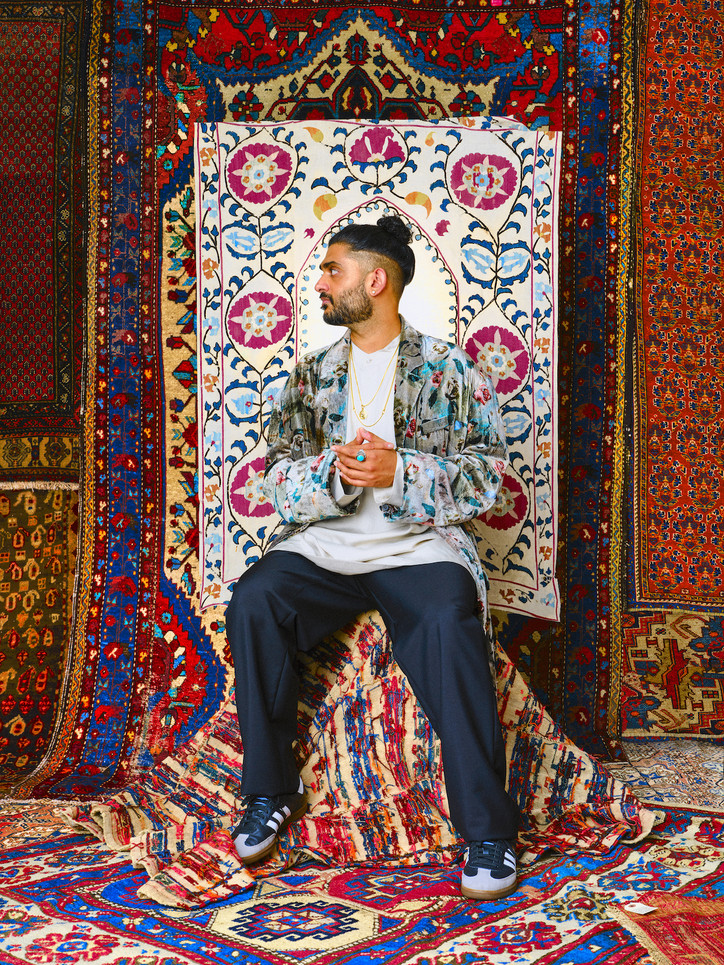
Speaking of intuition… when performing you look like you’re in a flow state: your eyes roll back at times and you have these erratic movements. What’s going through your mind and body when you’re up on stage?
When I'm on stage – and in the state of flow – the only thing that matters to me is being hyper-present to the point of mentally checking out. So it comes back to this idea of taking my mind out of the equation and becoming an empty vessel that is accessing and channeling something that some people would say is “the divine,” a greater power or whatnot. Some people just straight up say God, which is what I would tend to say. And when I hit those points of channeling, there are these intense waves of emotion or energy. When those really hit, those are the points where the eyes roll back and the body moves in convulsions. I feel like I'm elsewhere hovering above the ground. You're not thinking about what people think about you. You're not thinking about anything. You're there to allow the spirit of the energy to move through you.
Truth be told, I don’t think I’ve ever experienced flow but I know it’s not uncommon for athletes, artists, and performers to be able to tap in. How are you accessing that? Where does it come from?
My first conscious memory of it was when I was like seven or eight. Admittedly through the years they've been more fleeting rather than sustained. I think that comes from whatever karmic hangover I had from past lives where I entered this world with a certain kind of ability or perspective. It was something that was given to me so I treat it as a gift. I can’t say I'm the one that's making that happen. My job over the years has been rigorous practice such that I can find ways to sustain those moments. The source point, the sparks – those have been there my whole life. To take that and extend that outwards and make it a sustained experience both for myself and whoever is in the room with me has been a question of putting in the work every day.
It’s like a muscle that you’re training.
Straight up.
You have millions of Tamil- and Telugu-speaking fans around the world and now a growing English-speaking fanbase. What do you hope they’ll take away from this album?
I made sure not to try and predict how anyone is going to take this in because we didn't make it thinking about the people that are going to be listening. We made it as a pure form of emotional and creative expression. With that said, my hope is that folks that have been my fans from Indian film music… My hope is that it triggers or opens up some sort of an emotional valve in them because when you listen to something that feels like a new experience it has the potential to molecularly change the way people feel, and thereby, think. That's my hope. I listen to music from other cultures all the time where I don't know what they're saying, but it still hits me in an emotional way. I believe that there's a certain universality to this music.
For new fans, there's going to be a certain sense of representation that’s already happening and I’m very proud of that. My job is to be an artist that is unapologetically himself, you know? I said this at the end of my Roxy Theatre show a few weeks ago. I was specifically talking to all the brown folks in the room. You have the permission to be whoever you want to be and we haven't necessarily gotten that luxury so far because we've seen so little of us in popular culture. We feel like we have to adhere to this certain very narrow sense of excellence, but if there's anything I've understood from the process of making this album it's – and specifically talking to the South Asian diaspora–that you can make whatever you want to make and there's no need to have to fit some sort of stereotype or to be relegated to a very narrow sliver of identity and experience. That's what I want this music to do for my people.
My favorite track on your album is “Quiet Storm” – what are you saying in Tamil?
If you’re lost, can you find yourself?
This interview has been edited and condensed.
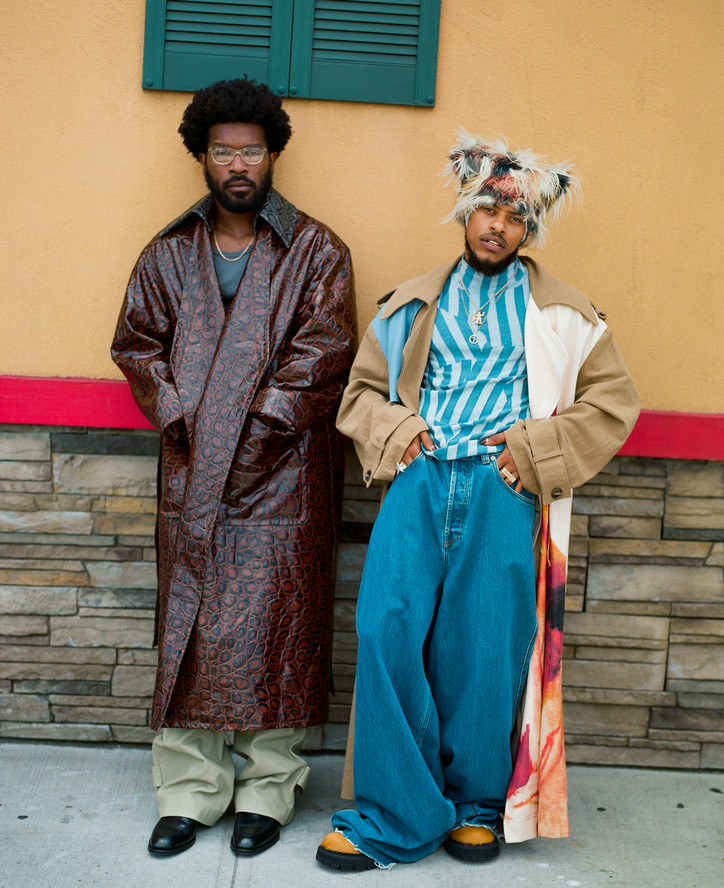
AHWLEE wears coat BOTTEGA VENETA, pants BURBERRY, tank top LOUIS VUITTON, shoes and jewelry TALENT'S OWN.
PINK SIIFU wears coat KIDSUPER, top KENZO, pants GUCCI, shoes CAMPERLAB, hat BUSYBDY, jewelry TALENT'S OWN.
What's up? How are y'all doing?
Pink Siifu— We just got off tour, bro. I feel like just taking a shit, going on Zoom and being on the couch all day. We still in LA so still not technically at home. Well, Ahwlee’s at home.
Where is home for both of y’all?
Ahwlee— In East LA, Montebello.
PS— In my girl’s lap, with my kids.
That's a beautiful home.
A— It’s beautiful and sunny in LA. It’s a good day. The hurricane is over.
I didn't even know a hurricane was hitting LA. That's crazy.
PS— But I guess that only niggas that was in LA really get that joke. There really wasn’t no fucking hurricane. They had a hurricane warning here. Tornado warnings, all types of shit, bro. And it was just a couple flooded streets forreal, forreal. It don’t rain here bro.
A— It didn’t hit. It rained really hard, very softly, if that makes sense.
PS— It’s like if God was the tall nigga that hit the top of the tent at a BBQ then hella water fell down.
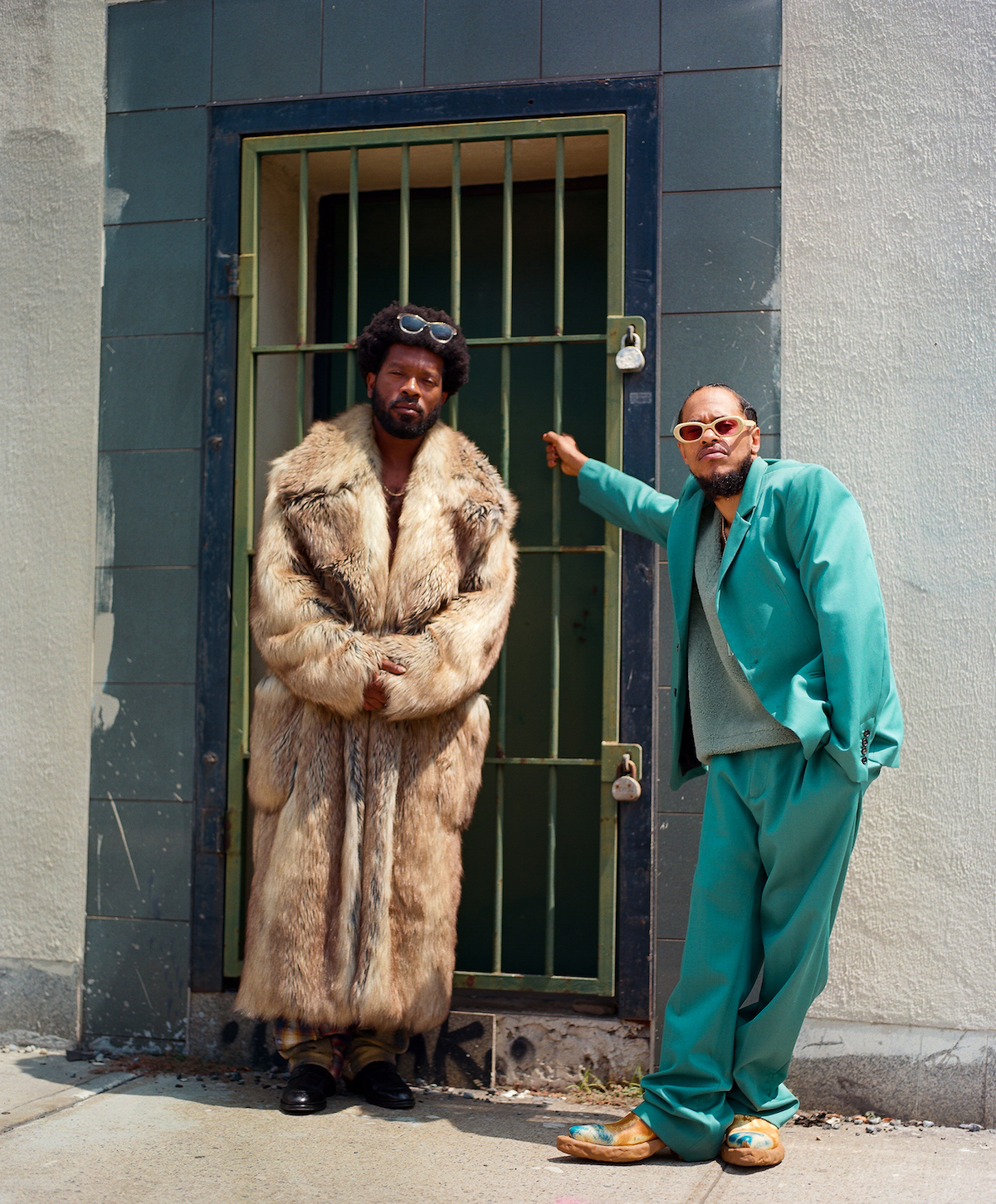
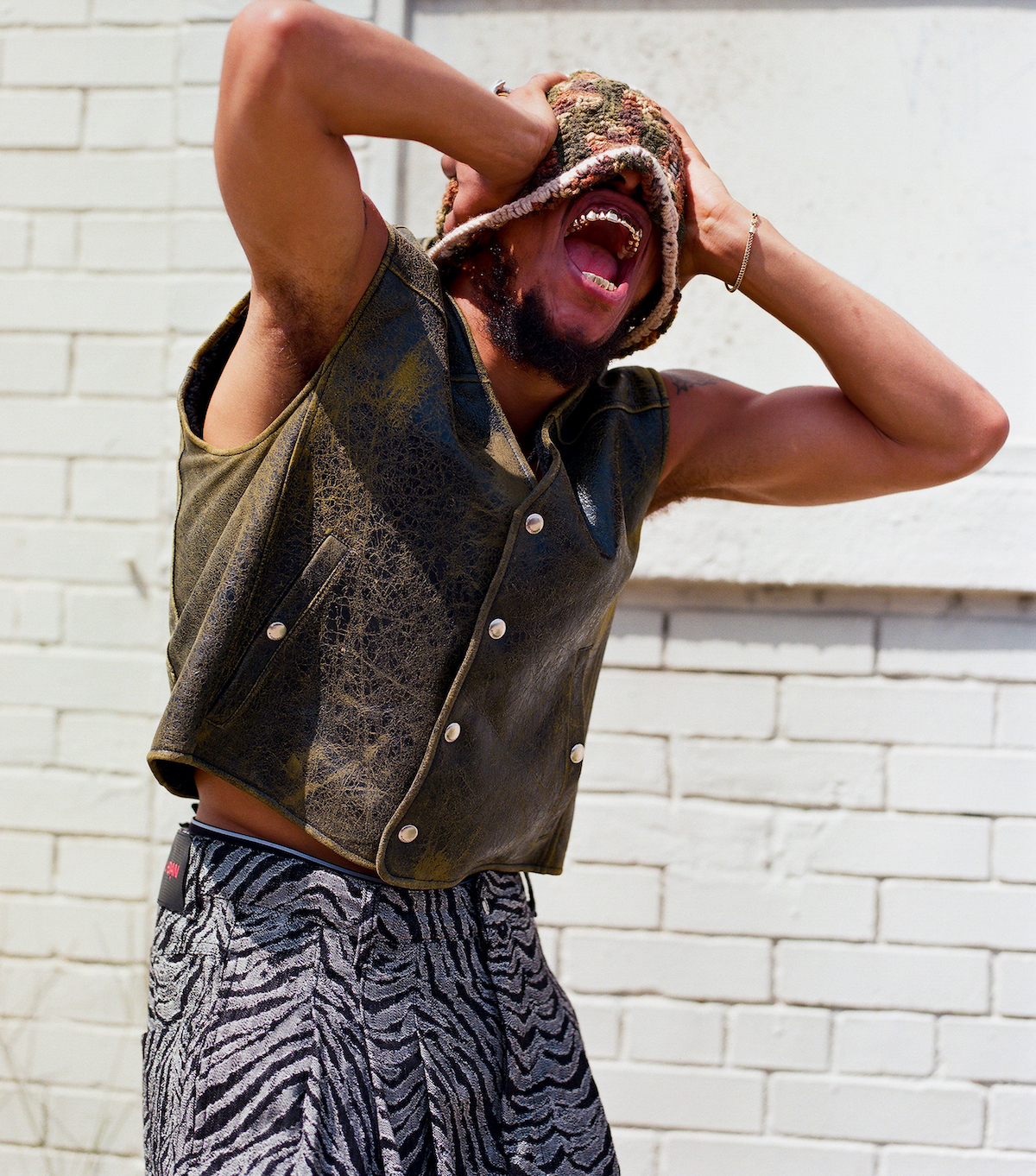
Left: AHWLEE wears coat and pants GIVENCHY, shoes and jewelry TALENT’S OWN. PINK SIIFU wears jacket, vest and pants WINNIE, shoes CAMPERLAB, sunglasses GENTLE MONSTER, jewelry TALENT’S OWN. Right: PINK SIIFU wears vest GIVENCHY, pants LU'U DAN, hat EDAS, jewelry TALENT’S OWN.
How did y’all link up to form B. Cool-Aid?
PS— Me being a couch surfer and being cool enough to be around the coolest nigga on the planet which is Ahwlee. We linked up, it was organic. It wasn’t no forced shit. No nigga sat us in a band and put underwear on us.
Like we met, we was drunk. He was like, "I fuck with you." I was a fan of his beats, he ain’t really know much about my music. He saw me rock one time, then was like, "okay I fuck with bro, I see where this can mesh." At the time Awhlee didn’t work with a lot of rappers.
It was real. It was a divine timing kinda thing but also not on no Rick Rubin shit. Shoutout Rick Rubin though but not on some Buddhist type shit. It was really like, 'okay, this works and this sonically makes sense.' He gave me beats and I was making songs to them like ASAP. So I think it was work ethic too, forreal.
Rick Rubin’s whole book is just lifted from Buddhism. Every word, man.
PS— I got a theory that no matter what color or race you are, so many niggas wanna be Buddhist for no reason. Rick Rubin is Buddhist bro. What the fuck you talkin bout? He’s Buddha.
Yo, you’re not wrong. I’m Buddhist too.
PS— Exactly. See bro, Mark Zuckenberig is Buddhist. I just seen it on South Park.
A— I don’t know if that’s true but like everyone’s Buddhist in some way.
PS— I’m waiting on Rick Rubin to cut his hair and be bald.
I don’t know if he could do the Common thing, with a bald head and a beard.
A— That shit is off-brand for Rick Rubin. It’ll ruin him.
PS— That’d be hard as fuck if he got straightbacks. Rick Rubin with the Nipsey Hussle’s would be crazy.
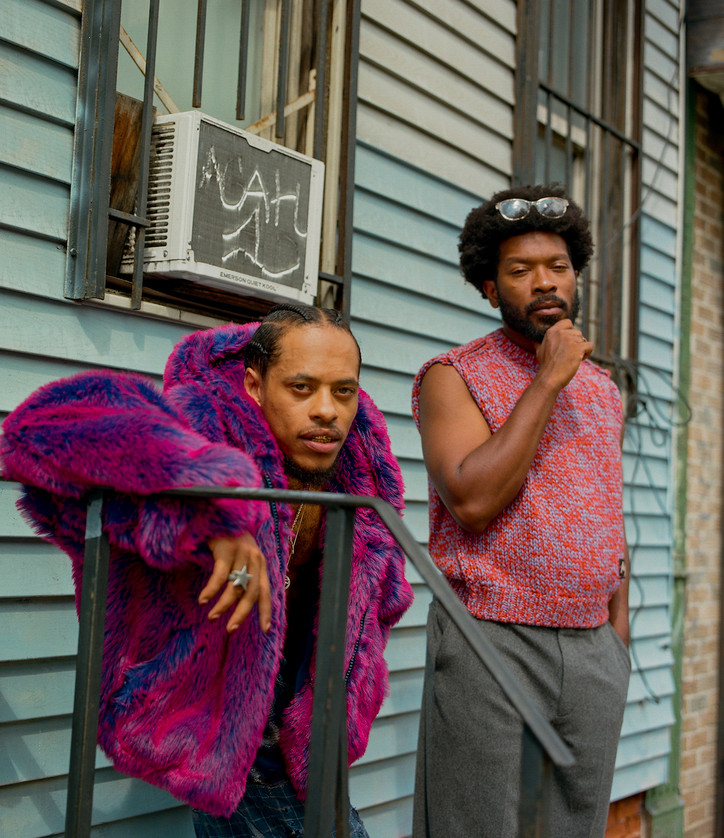
PINK SIIFU wears jacket and pants GIVENCHY, jewelry TALENT'S OWN. AHWLEE wears top PAUL SMITH, pants OFFICINE GÉNÉRALE.
I know that B. Cool-Aid mixes a lot of different sounds, do you guys believe in music genres?
A— Yeah, like as a tool for categorizing things but not as a law or anything like that.
PS— Ahwlee said it better than I could even imagine. Genres are a tool to find shit. Like Latin Jazz or Bossa Nova or Punk Music but there’s an album that could have all of that in it. So yeah, like what Ahwlee said, it isn’t like law.
There's a lot of features on Leather Blvd. from a lot of different corners of Black music. What do you guys look for in collaborators?
PS— Funk in the most saucy way. We look for sauce, creativity, shit you gone add that’s seasoning, skill. I love directing. But I also love alley ooping some shit to a nigga, just trusting that a nigga gone do what a nigga gone do.
A— Soul.
Can you tell me more about the concept behind Leather Blvd.?
PS— It's definitely a boulevard. It's the block. It's where niggas meet up, where niggas get fly, where the possibilities are endless. It’s a safe place, safe space but it’s dangerous.
A— It's that main block in your hood, in every hood. It’s where you can come get what you need. You can be outside, you can socialize and tap in with your community. It’s where everything is going down. It’s an open air swap meet for music, fashion, beauty, everything the Black community provides.
PS— And sometimes what the Black community in certain areas is missing. Every city, every hood doesn’t have a Leimert Park. Everywhere doesn’t have spots like they got in Brooklyn or spots in Atlanta where they got hella Black owned shit. So, you know, we just trying to give that light to what we’ve seen or where we’re from to spots that don’t really got that.
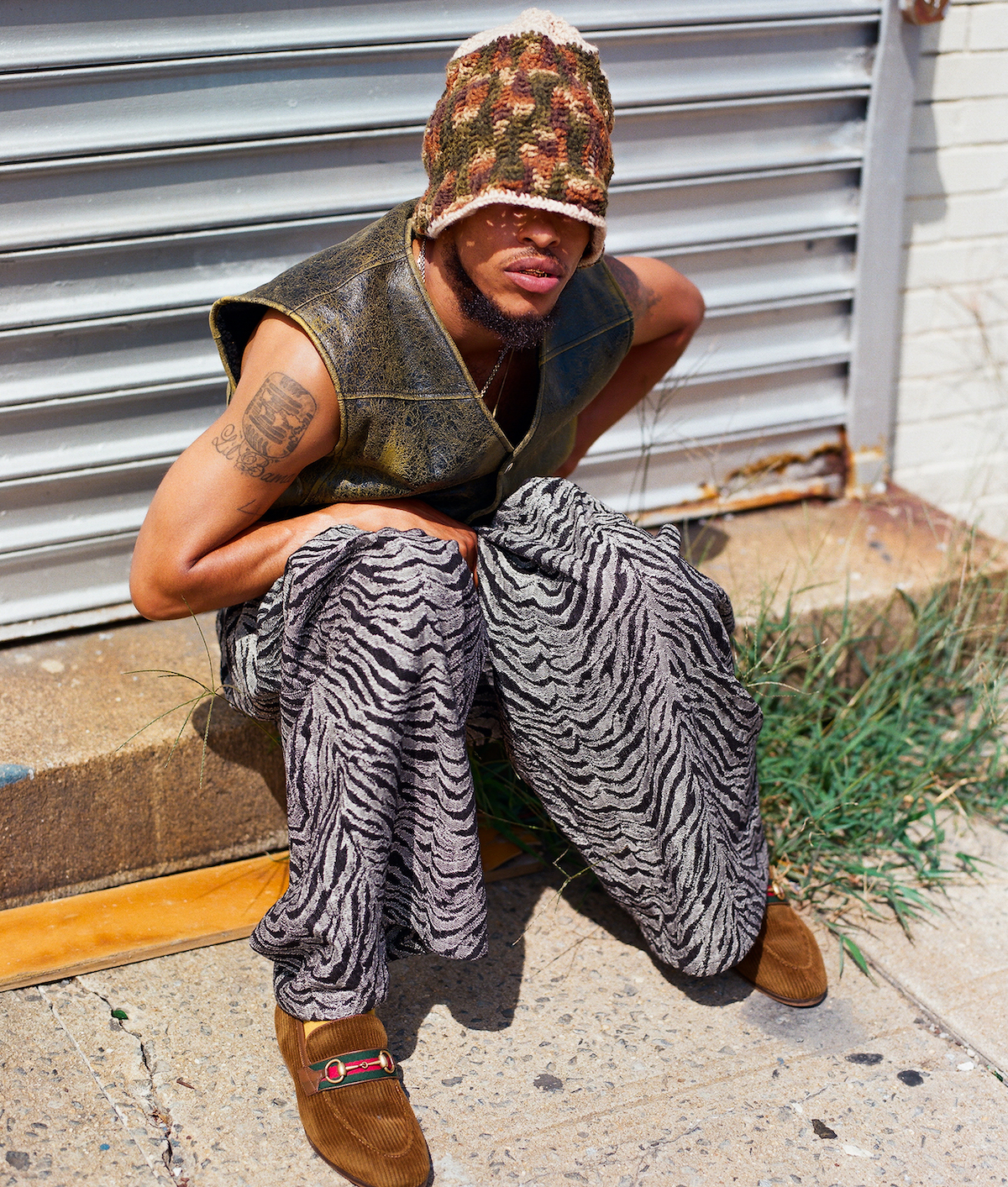
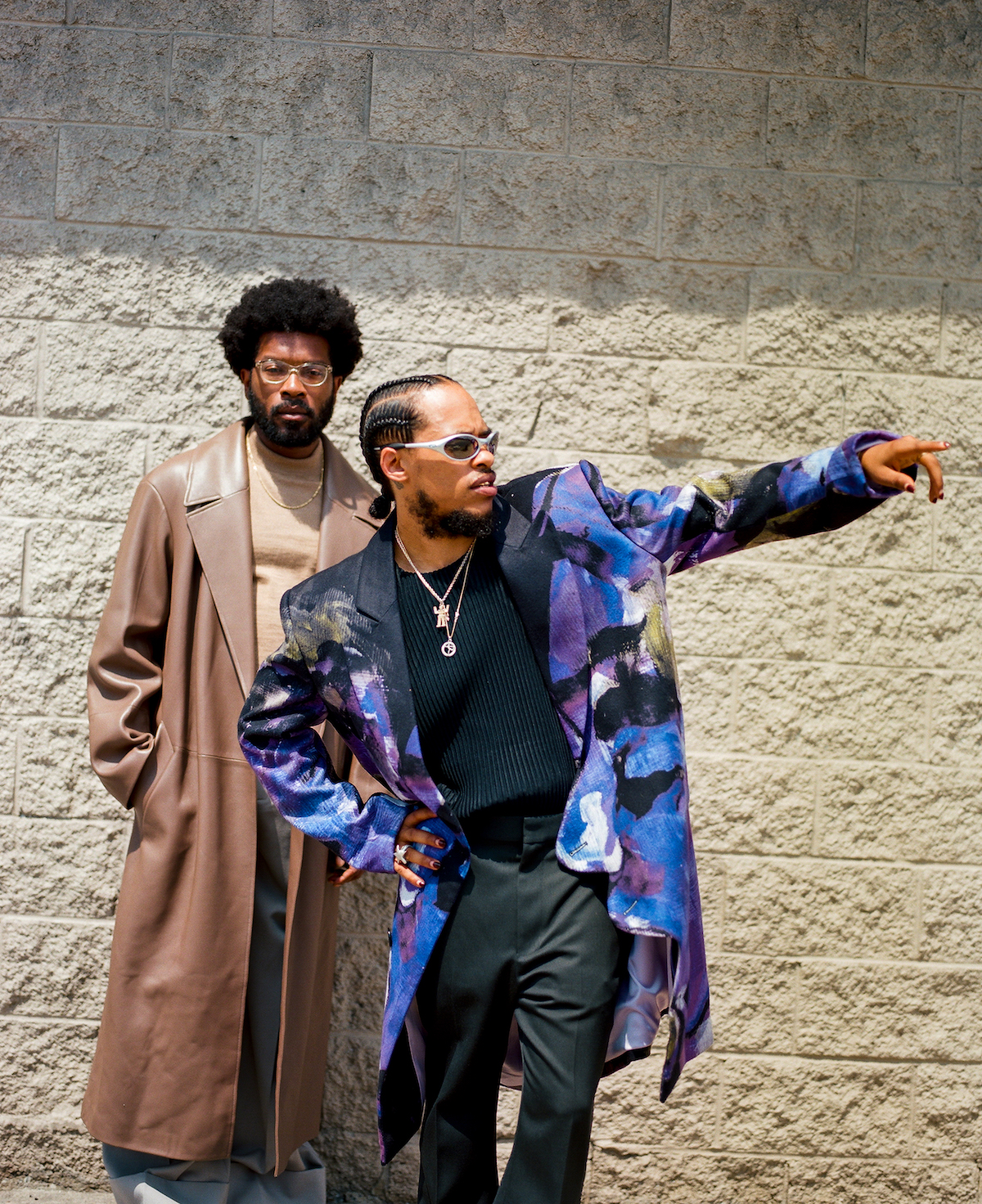
Left: PINK SIIFU wears vest GIVENCHY, pants LU'U DAN, shoes GUCCI, hat EDAS, jewelry TALENT’S OWN. Right: AHWLEE wears coat LOEWE, top J. LINDEBERG, pants LOUIS VUITTON, jewelry TALENT'S OWN. PINK SIIFU wears jacket KIDSUPER, top HOMME PLISSÉ ISSEY MIYAKE, pants LOUIS VUITTON, sunglasses OAKLEY, jewelry TALENT'S OWN.
What places were like Leather Blvd. for both of you growing up?
PS— Growing up and traveling, it's spots in London that remind me of Leather Blvd. especially when we were in Brixton. When me and Ali first did shows overseas, we had a show in Marseille and I was tryna get my hair done. That place was like a Leather Blvd. We went back to that block last tour.
For me, I didn’t have nothing like that growing up. I ain’t really seen no real shit like that till I went to LA and saw Leimert Park, it had drum circles and shit like that.
I feel that when I’m on Fulton, in Brooklyn. You got a nigga cooking on a grill here, club there, jazz spot there. Fulton is the prime example of a spot like Leather Blvd.
What was y'all's creative process? Could you walk me through a day in the studio.
PS— Shit…wake up and eat pussy. Then, go to the stu or call this nigga Ahwlee and see what he’s doing. Pull up to his crib. Make some shit. Fall asleep there. Leave in the morning. That’s in L.A. Then when I moved, we gone plot this. We’re gonna meet up in New York, we’re gonna meet up in Richmond and then we would just be in the lab for a few days to a week.
We would create and jam, not aimlessly but definitely open and freely. We would get musicians to come in and fuck with us. Then, get background singers to come fuck with us. Shout out all the background singers. But yeah, it was just an organic step by step process.
What are your favorite bars on the album?
PS— Definitely Ahwlee’s. Oh you talking about actual bars?
Yeah. Yeah.
PS— Oh man, I thought you were talking about bars on the boulevard. My favorite bars, shit. Probably Denmark’s whole verse. My verse on “Diamonds”. I ain’t got favorite bars. I’m not really like a bar nigga but Denmark got some crazy bars for sure. Big Rube’s poem on “fools_LSA” is amazing.
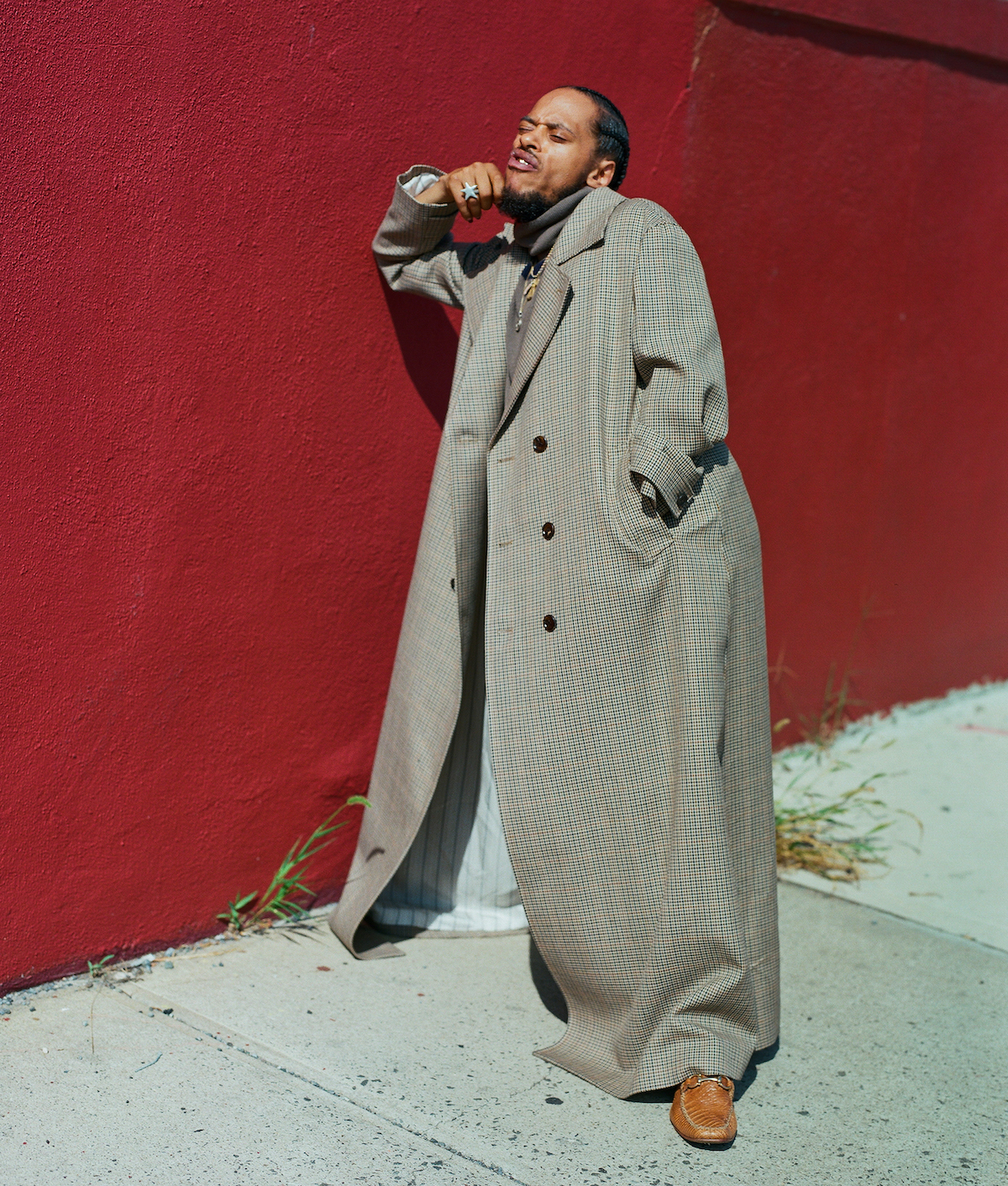
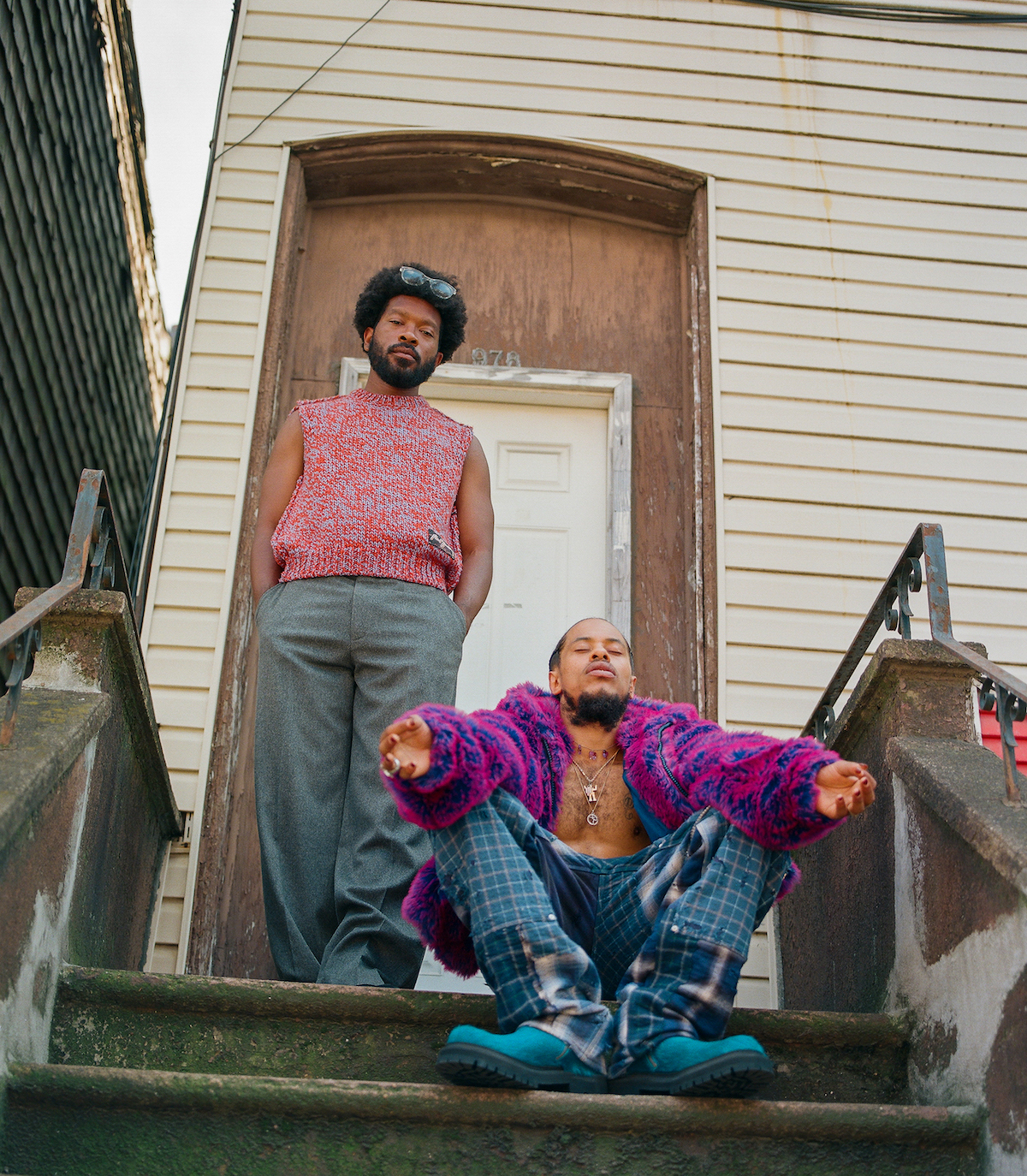
Left: PINK SIIFU wears coat GUCCI, top HOMME PLISSÉ ISSEY MIYAKE, sunglasses BALENCIAGA, shoes BELVEDERE, jewelry TALENT'S OWN. Right: AHWLEE wears top PAUL SMITH, pants OFFICINE GÉNÉRALE. PINK SIIFU wears jacket and pants GIVENCHY, shoes CAMPERLAB, necklaces KEANE and TALENT'S OWN.
What are your favorite beats on the album?
PS— I’ll let Ahwlee answer that.
A— “fools_LSA”, “So Soft Salon” and “Brandy, Aaliyah”.
What do you want listeners to take with them to Leather Blvd.?
PS— An orgasm and I want them to vibe to this album, use it to set the mood in the crib. You know what I’m saying, something soothing, it don’t gotta necessarily be relaxing. But it feels good on your ears. I feel like it’s definitely a level up.
I feel like this music is grown, very mature, beautiful music. I want people to take in the detail of it and the soothingness.
A— I want niggas to use it as a weapon, as a tool. Set the mood for your life.
PS— You feel me?
Song: Wassup - B. Cool-Aid, Pink Siifu, Ahwlee
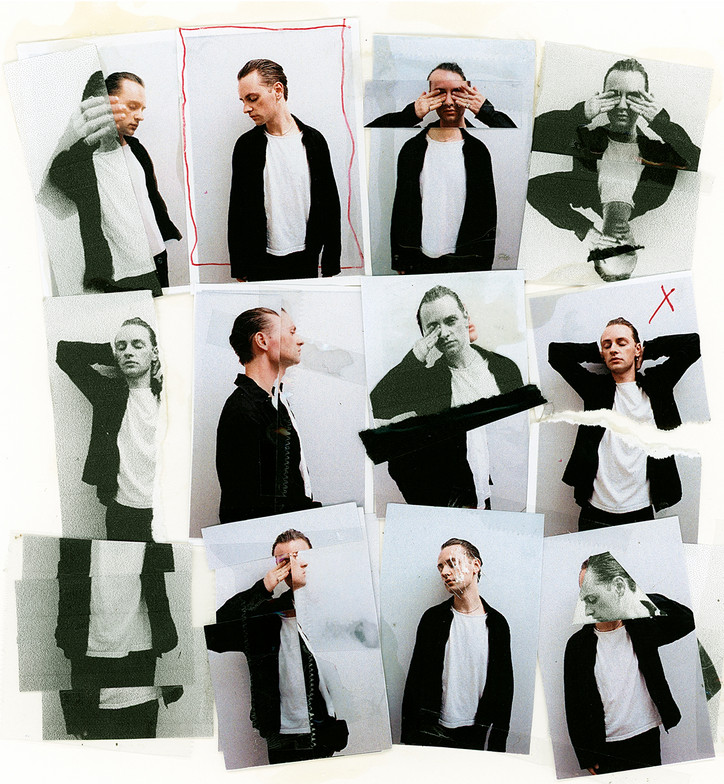
The handful of times I’ve gotten to see Jacob performing as Puma Blue, there’s been such a surreal quality. His stage presence and vocals innately command a quietness and undivided attention — not because he has demanding energy at all — but because he gives off such a captivating stillness and sense of softness. When an artist is willing to go so far into their own inner world to articulate their feelings, you can feel it. I remember vividly the first time I ever saw him play at EartH in Hackney – I genuinely just kept thinking, “Wow.” That was also the first time I cried at the then-unreleased “Silk Print,” off In Praise Of Shadows (and it still makes me cry). I know I sound unabashedly biased given that I’m writing about my friend, but I’m very anti-lying or fake compliments, so you’ll just have to believe that about me.
Describing someone you’re close to can sometimes feel contradictorily hard, but if I were to describe Jacob, the first word that always comes to mind is “gentle.” There is something so soulful about his nature. He’s also one of the least pretentious, most sincere people I’ve ever met. I asked Liv how she’d put him into words, and she said, “he’s the first person to lighten the mood, but also the first person to take it to a really deep place too.” We both agree he embodies that duality. She compared it to “lighting the candle in the dark space” — embodying both intensity and levity. The care he shares with me as a friend is something I’ll always be forever filled with gratitude for, and that same attentiveness I see so clearly in his work. The sincerity and emotional space he gets in his lyricism is truly palpable.
Throughout our time knowing each other, a natural part of our friendship has been me asking a ton of questions and Jacob intentionally answering each of them with such candor and earnestness. His new album Holy Waters — influenced by Portishead, D’Angelo, Jeff Buckley, CAN, and Pink Floyd — is out today, and we spoke about it for office.
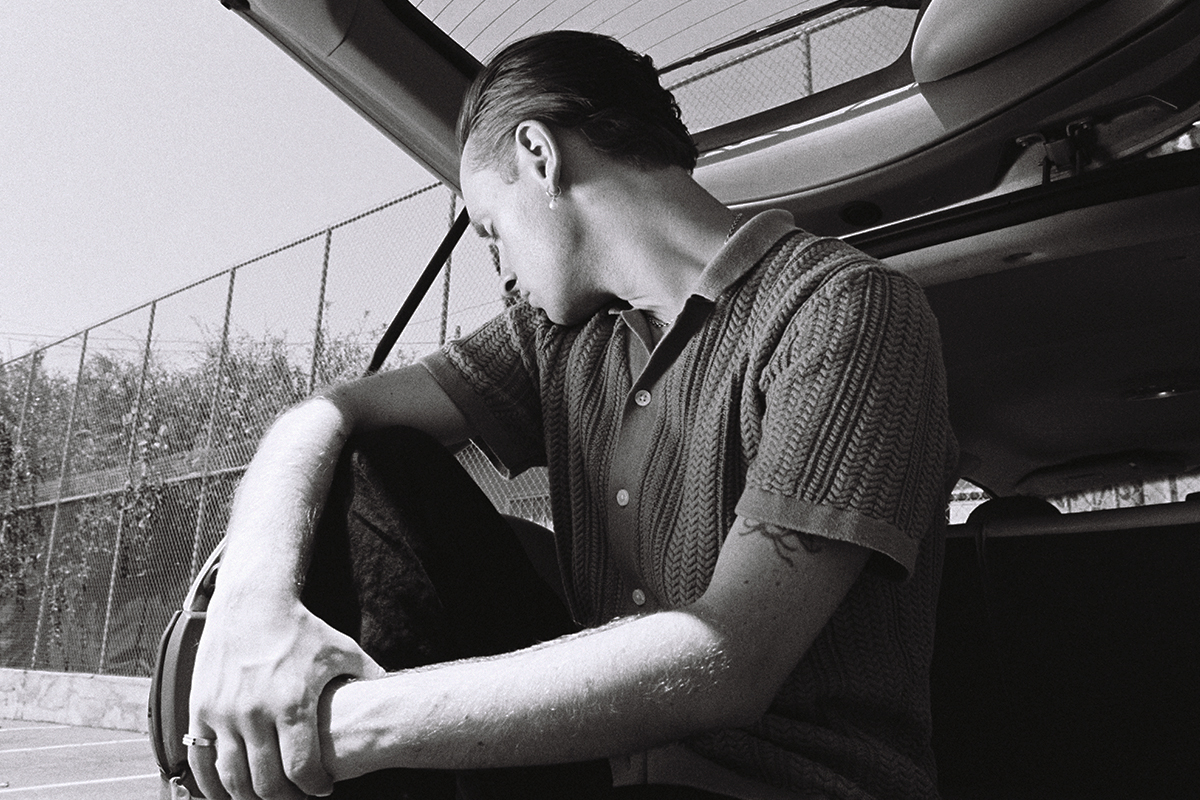
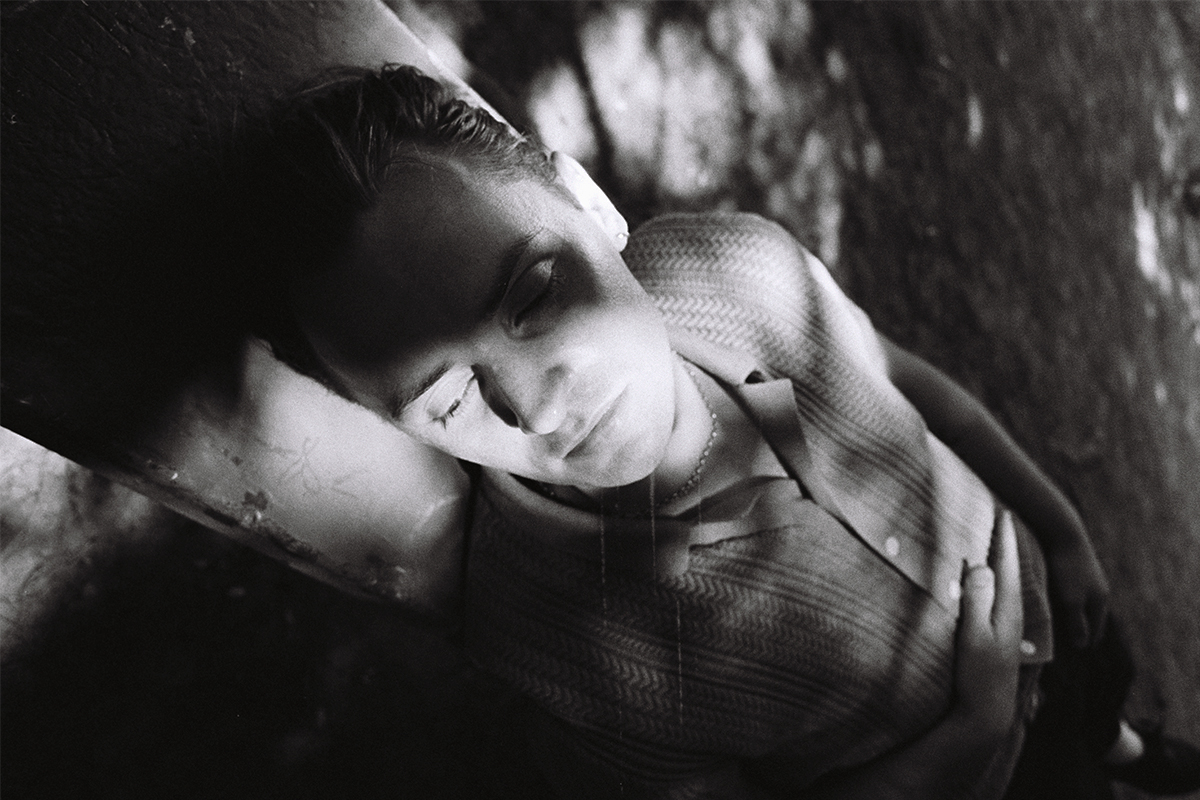
How are you feeling in general pre-album release? I know sometimes you've talked about feeling like you're ready to just put something out, or that it's been a long time coming. I’m wondering how you’d compare this to other releases.
That's really interesting actually because I distinctly remember talking to you about the last one, and how I was feeling when it was finally time for it to come out. I just didn't feel very close with the music anymore, it felt like something that I really needed to say a while back, and now that it was time to share that thing that I had wanted to say, I didn't really need to say it anymore. It felt a little delayed. I was obviously excited to have a full-length album out for the first time, but I felt pretty critical of that record by the time it came around to release. This time I honestly feel butterflies. I feel so excited and so proud of it, and I feel this strange nervousness almost. I think I'm just excited for this thing to be out in the world. Although I've still been digesting it for what feels like a long time and working on it. For me, the album's been done for a long time — obviously, for the listeners, it's going to come out and it will feel brand new to them. I still feel really close to it as a piece of work, and I just have never felt so relaxed about or happy with a body of work before honestly.
What do you think it took to get there? What’s making you feel so close to it?
I think it's a few things. I feel like it's maybe the most “me” music that I've ever made. Not to say that the stuff I've made before wasn't sincere, honest, or a good reflection of who I was at the time at all, but more just that this time I feel like I've managed to wear my heart on my sleeve more honestly, or more profoundly. More of my influences have kind of made it into the music, from the more obscure stuff that I love to sort of pick over and almost study, to the most corny stuff that I was listening to as a kid. I just feel like it's like the most Jacob-sounding Puma Blue music.
What was something you listened to growing up that made its way into influencing this music?
The stuff that I feel like I've put into this album from my teenage years. It's just maybe not “cool” to say that you like it, but I'm kind of just over that. So, Red Hot Chili Peppers, for example…
Literally, I was going to ask if that's what you were gonna say!
Yeah. They were just so important to me growing up. That's the first time I remember music feeling like it was speaking to me directly, not just something that I was enjoying that my parents had put me onto or were playing. I think when you have that experience with an album or an artist because it was your first time, and it was your most special time, how could you not feel that same connection to it, that same nostalgia? Regardless of how the music has aged when you listen to that music, you're connecting with that part of yourself that was young and was almost hearing the music for the first time. They ended up being really important to me, and as a guitarist and as a writer and as someone who was learning about the idea of “feel/don't think,” they were kind of the template for me as a young musician. I found that language, and that kind of feeling and soul poking its head out of the water a few times when I was making this album and just being like, “Wow, that, that reminds me of the Chili Peppers.” And I've never really had that with my music before.
Yeah. That's cool.
I think another thing though was the band. Whenever I’ve released music before, when it comes out, I'm kind of self-conscious. It's sort of like this photo I've taken of myself a year ago that I was maybe happy with at the time, and then a year or so later, you have to post that photo and suddenly you're like, “This isn't what I look like anymore.” Like, “I don't even wear that jacket as much anymore.” You just kind of feel more critical of yourself. But on this album, for as much as I could criticize myself and be self-conscious, I think what takes over when I listen back to it is just the joy I get from hearing us as one body. We were four, sometimes five, people making this music together. When I hear it back, it's a reflection of them as well. So I'm less cringing at myself, and more finding this kind of family portrait really beautiful, you know?
Yeah, that definitely makes sense. Can you talk a little bit more about that side of things? Basically, before you weren't making an album in the same way with the band having as much input. How would you describe that to someone who doesn't know about that?
Well, Puma Blue has been that I've always had a live band, and it's kind of changed over time, but a couple of the guys have been in it since pretty much the beginning. This current lineup is about six years old. It's not like it's still been changing. It feels like a band. But the way I used to create music, and still do to an extent, is just by myself, either with a guitar or computer, and I just produce everything myself. And then if at some point, I wanted Cam's expertise as a bass player, or the sound of live acoustic drums rather than my programmed drums, I would get the band involved. But it’d usually be overdubbed, except for maybe I can think of three or four times in the past where we had like tracked something live together. With “Moon Undah Water” or “Lust,” the bones were recorded together live, and then we did overdubs over the top. On the last album, once I'd finished writing the songs and I was starting to produce them and thinking about where I could take these demos, it was suddenly lockdown. It was basically this forced situation of, “Oh, okay, I guess I'm making another laptop record where it's kind of just me on my own.” There are little moments, like in “Oil Slick,” that had a live element to it, but I just felt really uninspired to make music alone. After I finished the first album, I spent maybe a year writing stuff that I hated and it felt like writer's block, even though I was writing music because I didn't finish anything for a whole year. I didn't have any music that I liked, and I started to wonder if I was ever going to be able to make something decent ever again, and it was really fucking depressing, to be honest. Eventually, I started to make songs that I liked at the end of the year because I remembered to have fun, and I'd already been into this idea of involving the band more because when we play live, I feel like the music really kind of comes alive on its own.
What did involving the band look like?
I encourage the guys to improvise, and there's this feeling that even though the structures are kind of there, that the songs are never the same night to night. I usually feel like that's where we sound best, or that's where my music really feels like the best it can be at a gig, with all of us playing together. It was kind of in the back of my mind already, where it's almost like a live show. I think what really did it for me was watching The Beatles series. It was around Christmas of 2021, and I watched the three parts and just felt really inspired by how messy it was, and how they didn't really know what they were doing, and they were kind of just jamming and wasting time, and it was really dysfunctional. It made me realize I was focusing way too much on this idea of perfection, even if I didn't know it.
I got together with the guys in February 2022 for a week and a half, and the idea was just to re-record some songs with them as a band. But what ended up happening instead is we did that in a couple of days, and then we had a week and a half left, and they were inspired by some of the demos that were less finished, so we rearranged certain songs. Some songs that ended up on the album just came from jams where someone would start playing something and a whole song would come of it. In some cases, we would just be jamming for an hour, and record the whole hour, and it would just be this nonstop hour-long piece of music, and then we'd listen back to some of it, and a tiny moment would perk up my ears, and would run into the next room and start writing something based off that little part that we'd all just kind of built together through improvisation.
Another part of the album was these songs I had already written and just decided to record with the band, and the other bit of it was songs that were ideas more than songs that the band helped me realize. There’s also new music I'd never ever written with the band before, where we were all in the same room and throwing ideas around. When I listen back to it, it really does feel in a way like the live shows. I took those studio recordings back home and did my kind of whole thing on the laptop that I usually do, where I produced it and made it feel atmospheric or whatever. It was crazy. I've never made music like that before, and it really just opened everything up.
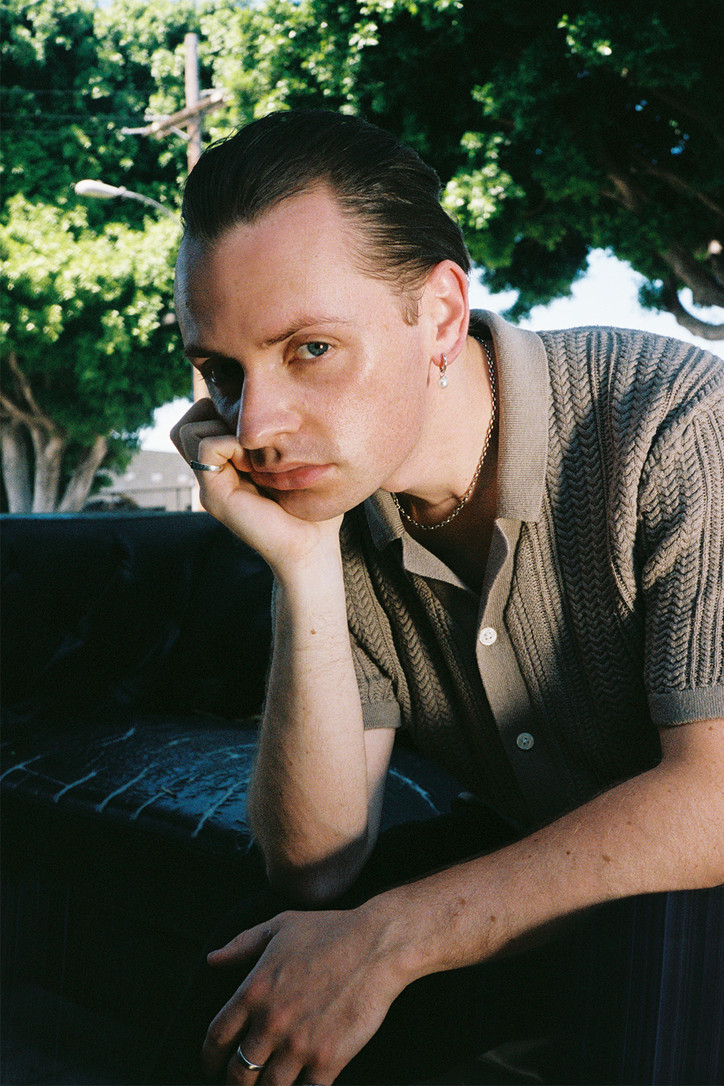
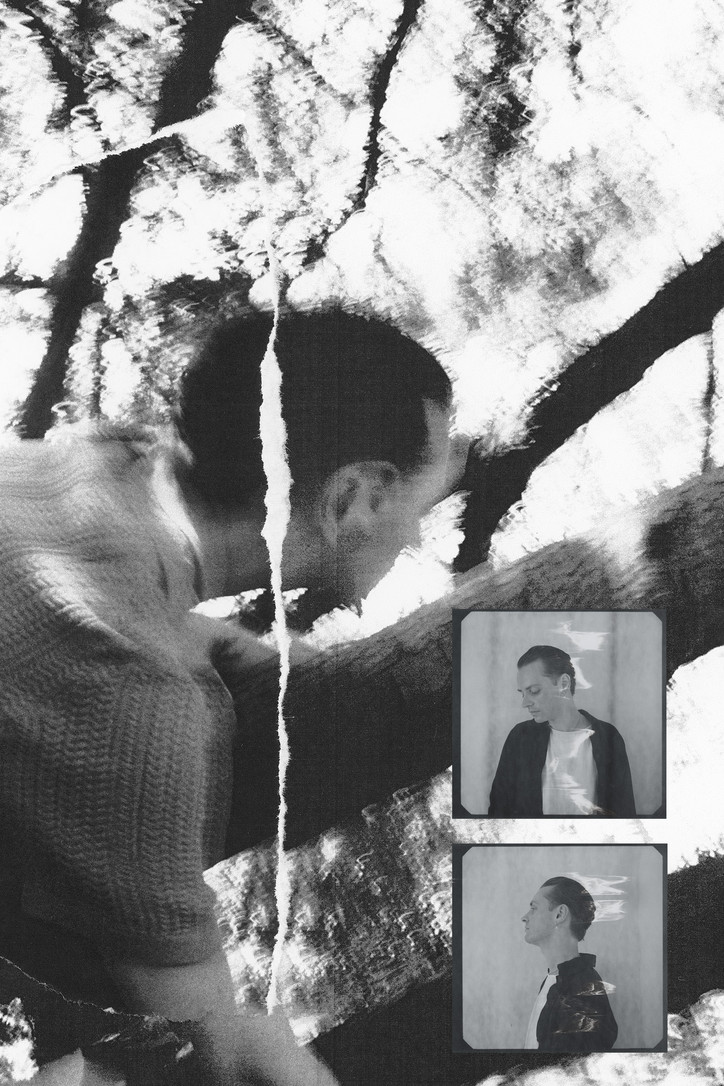
The press materials for this album talk about confronting themes of death and grief. Was that an intentional choice in the writing process, or was it kind of like you looked back once you were done with it and were like, “Oh, we just made all these songs that have to do with a common thing?”
It was kind of halfway between what you said. I didn't set out to make an album about death from the start, but halfway through I started realizing a lot of the songs were about dealing with death in some way. Whether it was grieving, writing a song about a friend who had died a long time ago, or there's even a song of a kind contemplating how I'm glad I didn't die already because I'm in this great love. That's kept coming back around. It was surrounding us during the writing of this album and during the making of it, it felt like everyone in the band went through something. In trying to write something sincere, I kind of just couldn't get away from it. But it's funny, the first four songs aren't about death at all, and then suddenly all the rest are. The way I look back on it now is that the beginning of the record is just music about trying to accept things that you can't change that are just part of life. The middle point, the turning point of the record, I stumbled upon the ultimate thing that you have to just accept, that just is part of life, which is just death. That wasn't something I intentionally did with the running order, but now that I look back on it, it feels like there's this seed planted at the beginning, which is accepting what you can't change, and then it starts to become an album about death slowly until it's like very clearly just about that.
In terms of the acceptance that you're talking about, do you feel like making these songs has helped you get closer to that, or is there any larger takeaway you’ve had?
I definitely don't feel like I just have a straight answer for you. My immediate takeaway from finishing the album, and being so close to this kind of message, was that as much as I have not completely accepted these things, I've improved I think at accepting these things. The closer I've come to accepting death and these other things, the more I've realized that acceptance isn't the absence of experience. It's not going to hurt any less. I finished this album and went through all this rumination about death, and looking at it closely, and singing about it. Really soul searching, discovering how I feel about it, and exploring it. And then I experienced a death in May of this year. It almost was this shocking reminder. I definitely felt the most prepared for it of any death that I've experienced in a way, I felt more ready to just accept what was happening, and feel like it was in this big picture way that it was okay, but it still tore my heart out. It wasn't like accepting it made it feel any better. The grief was still almost to the limit of what I thought I was kind of capable of feeling. But I did have more peace if that makes sense. The pain was there, but I had more peace.
That definitely makes sense. The level of genuine introspectiveness from you is so apparent in these songs.
I think that's what it was about for me. Trying to look things in the face a bit more and tackle them. I recognize that I'm a young person still, or relatively that this album isn't a thesis on death or anything like that. I probably will feel at some point in my life that I almost didn't know what I was talking about on this album. But that's part of the acceptance too, is just accepting that death is so much bigger than I am. In exploring it, I didn't really find many answers. It was an album more about expressing and feeling and not really trying to intellectualize too much.
Can you talk about how you go about engaging with putting your most intimate feelings out there and sharing yourself and your emotional states publicly?
I'm not saying it's not a conscious choice, but it definitely feels like it's in my nature. I don't know that being emotionally vulnerable, or fragile, or whatever you wanna call it, is as easy for everyone. But for some reason, I'm very drawn to it, to the action of it. Part of it is that I only really want to make music when it feels honest and sincere, and I get very bored when I'm trying to make really broad songs, or writing about stuff that I don't really care about. In a way, that was why I had experienced that writer's block. Because I was trying to write cool, easygoing music that maybe the fans would like and would be just kind of fun to play. But that’s not really what I was feeling though. Finally, I was more honest in my writing, and writing about these things that, as you said, were maybe quite vulnerable, whether it's the song about my grandma or the one about my friend who died. Even “Pretty” felt vulnerable to write.
Because I was writing from the heart, I saw it through rather than just losing focus and getting bored and thinking, “What’s the point in this?” It felt kind of like this mission of, “I've just gotta write things that really feel true to me.”
I feel like maybe that's something I have to offer. I don't really love my voice, and I'm not like an incredibly technically proficient guitar player, or like “all that” to look at, but I sort of feel like there are lots of people that can be those things, and this is something that I can be that feels just a little rarer, I suppose. Also, in the music I connect to, this feels like a common thing, but something I feel I can contribute, at least to the music world, is just fragility and openly emotional space. Sometimes I do take a step back and I'm like, “fuck, should I be sharing this?” Or like, “Was that too much?” Or “Do I want to keep some of this back for myself?” But I end up feeling like it's more artistically bold and true to myself to let it all hang there, rather than keeping it to myself.
I need to also address the classic interview question about the title Holy Waters and what that means to you.
Holy Waters in my imagination was basically a metaphor for the inescapable. I imagine it almost like a swirling pool or tidal wave. It doesn't really matter which direction the water is going, the point is that it's much bigger than you, and seems to hold all the knowledge of the universe inside of it. And you're going to get sucked into it and it's going to pull you under. I guess the message of the album is: What do you do about that? There's resisting it, or there's getting swept away by it, or there's also this idea of accepting it. That's kind of what I'm doing on the album cover, is letting this kind of void swallow me from behind. But I think I look peaceful. I suppose it was coming up a few times before, actually, before I wrote the song “Holy Waters,” which is so strange to have written the title down in a notebook before I had the song, rather than naming the album of the song. It started to feel like that's what I feel connects us all, is this kind of almost godly, aqueous entity of some kind that is going to swallow us and take us. You could see that as a metaphor for death, or it could just be the stuff of life, but holy waters is a metaphor for depression. The album was somewhat about these different ways that we are engaged by this water.
There are times when maybe you are drowned by it, or you are able to keep your head above the surface. But I think by the end of the album, I'm finding myself just leaning back into it, and letting it kind of just take me, and that feels like the message. I hope that makes sense. It's kind of a hard one to explain.
Are you already thinking about the next album after this, or do you not let yourself get that ahead of yourself?
After the first one, I just needed a break. I needed so much space from Puma Blue for some reason. I guess because I'd been obsessing over it alone, and I was very ready to give it some space. And then I had that writer's block, so album two just felt like it took a long time. But I finished Holy Waters at some point last year, and I got the finished versions in January, and I just still felt so inspired and excited about music. I went ahead and right now I've got 20 songs already for the next record.
Wow.
And it feels really different too. It doesn't feel like stuff that could have been on this record. I've never really had that where I just feel so prolific so quickly after finishing work. I don’t know where that's come from. Maybe it's just the kind of spirit that I have for music right now where it feels like I'm connecting to it as a child again.
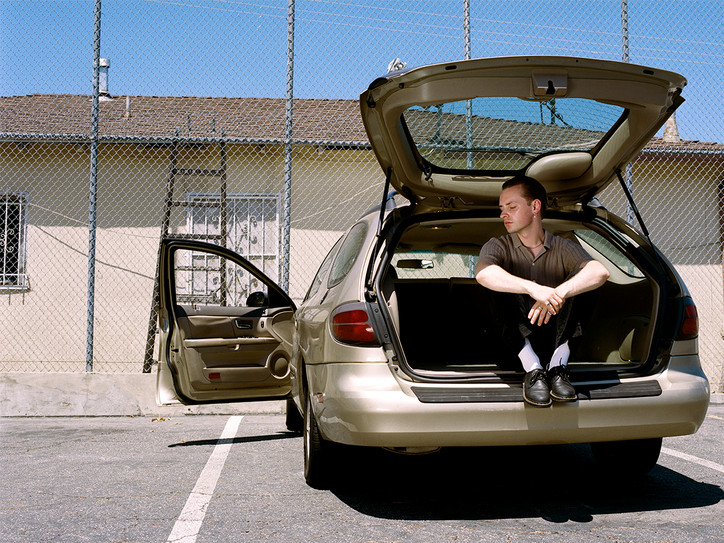
Does it feel like you cleared and opened up a lot of emotional space?
I've said some things I needed to say. Like you said, I have cleared the space, and making an album is weirdly like a therapy session - just a very long one. I feel like with the first two EPs, it was almost like I was trying to show the world that I was just “something” - just kind of trying to introduce myself, and what I was about. Then the first album was almost like a reaction against that because I was worried about boxing myself in, and I was getting really bored with some of the like kind of colors I was using. And then this album was just honestly me being free, and just realizing I was overthinking it and just trying to be myself again.
It’s allowed me to create the Puma Blue album that, to me, sounds like what I've been trying to do for years. It sums it all up and feels like a pretty definitive statement of identity “This is who I am.” I've finally been able to get it. I'm realizing that if Holy Waters is kind of like a definitive identity piece in a way, then it feels like that frees me up to do something really different. Maybe that's not bound by what I thought Puma Blue was, you know? I can just kind of make any kind of music.